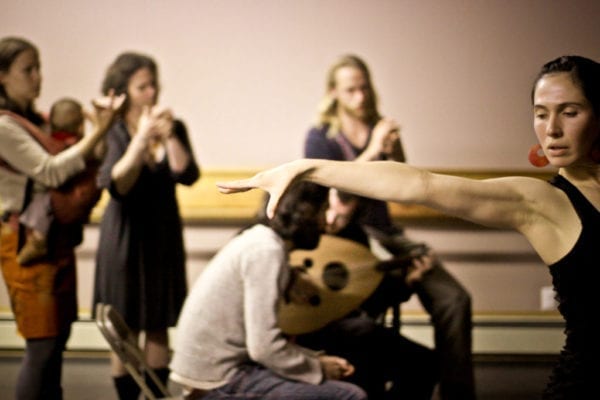Embodiment Studies is an emerging, transdisciplinary field drawing on and influencing work across a range of inquiries and practices, all seeking 1) to understand human life as the life of the body in a physical universe and 2) to restore bodily experiences as an essential subject of knowledge and ways of knowing.
The Embodiment Studies concentration offers students the opportunity to engage their inquiry through the lens of the body as the ground of culture, cognition and perception. To do so is to honor the intelligence of the body and its limitless capacity for insight and liberation.
Embodiment Studies students come with a diverse set of inquiries and a shared vision – to engage in work of critical reflection and reconnection with respect to lived bodies, social bodies and the living earth.
The Embodiment Studies concentration is available to students enrolled in any of the degree options within the Goddard Graduate Institute. The Goddard Graduate Institute offers three Master of Arts degrees: The Individualized Master of Arts, the Master of Arts in Health Arts and Sciences, and the Master of Arts in Social Innovation and Sustainability.
The Faculty
The faculty in the Goddard Graduate Institute have longstanding presence in the college and bring to their work a host of professional skills and disciplinary areas. Fields of expertise include consciousness studies, expressive arts therapy, ecopsychology, cultural studies, gender studies, poetry, literature, psychology, natural history, organizational and community development, neuroscience, medical anthropology, religious studies, theater, and Ayurvedic medicine, among other areas. Much of the work and interests of the faculty is in keeping with the college’s activist and social justice mission. The faculty also have a range of international experience both in terms of work and research conducted in other areas of the world and in terms of their own lived experiences.
Admissions Information
Goddard offers students the ability to chart their own paths and develop, or further develop, the habits and skills of life-long learning.
All applicants to graduate degree programs must supply evidence of having earned an undergraduate degree from a regionally accredited institution of higher education.
See complete application instructions.
Location
Twice a year, at the start of each semester, students attend an intensive eight-day residency at the College’s Plainfield, Vermont campus. Residencies are a rich time of exploration, connection, and planning.
Low-Residency Model
At the start of the semester, students attend an intensive eight-day residency in Vermont, followed by 16 weeks of independent work and self-reflection in close collaboration with a faculty advisor. Goddard pioneered this format nearly a half century ago to meet the needs of adult students with professional, family, and other obligations seeking learning experiences grounded in the real-world.
Residencies are a time to explore, network, learn, witness, and share with peers, staff, and faculty. Students work with advisors and peers in close-knit advising groups to forge individualized study plans that describe their learning objectives for the semester.
Working closely with their faculty advisors, and supported by fellow learners, students identify areas of study, personal goals, relevant resources, and avenues to achieve these goals. Students also attend and are invited to help organize workshops, keynote addresses, celebrations and other events intended to stimulate, inspire, and challenge.
This low-residency model combines the breadth of a collaborative community with the focus of personalized learning, enhanced by insightful exchanges with a faculty advisor.
Work of the Program
Embodiment Studies students are expected to:
- Attend residency mini-courses and workshops that explore core concepts.
- Engage with core readings related to the various traditions of Embodiment Studies.
- Familiarize themselves with the conversations in their field and situate themselves among the different perspectives.
Study and reflect upon research design and ethics relevant to their areas of inquiry. - Ground their learning in an engaged practice: A personal practice or community engagement is designed by students with the support of faculty. Students are encouraged to choose at least one of these applied praxis areas: somatic disciplines, health modalities, methodologies of bodily reintegration, arts practices, and projects related to ecological bodies and environmental justice, projects and practices that address issues related to bodies at the intersection of race, class, gender, sexuality, national origin, dis/ability, sexual orientation or religion.
- Demonstrate integration and embodied leadership: Students reflect on their learning through the lens of their own growth and development, understanding how they are positioned in learning and how their embodied experience of intersecting social identities shapes their learning and their leadership. Embodiment Studies students research and write critically on their own embodied social identity, including racial/ethnic identity, as part of their Change Agent and Identity Paper. This, in turn, will inform their Final Product.
Core Concepts
Students participate in inter-/transdisciplinary conversations in the sciences, social sciences, humanities and arts that inform Embodiment Studies, with careful attention to historical and social constructions of knowledge. Students engage with pertinent theory through these core concepts:
- Embodied Epistemology: Locate, critique and seek to mend dichotomies, binaries and dualisms – such as, mind/body, knowledge/belief, self/other, spirit/matter, culture/nature, masculine/feminine, and science/art – drawing on work from an array of fields and disciplines. Engage in embodied scholarship, cultivating and critically attending to their own bodily knowing and body scholarship as essential to their work in the program.
- Ecological Bodies / Bodies in Place: Investigate relationships to land and place and to other nonhuman bodies, and gain an understanding of the rootedness of emotions, ethics and cognition in the more-than-human world.
- Social Bodies / Bodies in Culture: Gain an understanding of intersecting social identities and the ways that these identities shape bodily experience and knowledge. Explore the intersection of embodiment, justice, privilege, power and activism.
